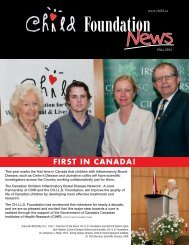Spring 2012 - The CH.ILD Foundation
Spring 2012 - The CH.ILD Foundation
Spring 2012 - The CH.ILD Foundation
Create successful ePaper yourself
Turn your PDF publications into a flip-book with our unique Google optimized e-Paper software.
IN THE LAB…<br />
How Our Gut Bacteria Talk To Us<br />
An Important Conversation in Health and Disease<br />
By Natasha Ryz, PhD Candidate<br />
<strong>The</strong> human body is<br />
teeming with bacteria – in<br />
fact; the average healthy<br />
person has 10x more<br />
bacterial cells in their<br />
body than human cells!<br />
Although this may sound<br />
alarming, the normal<br />
bacteria found in our<br />
Natasha Ryz<br />
body play a very<br />
important role in keeping<br />
us healthy. For instance,<br />
the good bacteria in our intestine can break down fibers<br />
from our diet, make vitamins we need to survive,<br />
compete with invading bacteria and even boost our<br />
immune system.You can think of these bacteria as good<br />
neighbors or tenants, and they live inside<br />
you-making you their landlord!<br />
As long as you have good bacterial tenants, you will<br />
remain healthy and in part, this reflects good<br />
communication between gut bacteria and your<br />
intestinal cells. Bacteria can talk to our cells by using a<br />
type of “receiver” found on the surface of intestinal cells.<br />
This can be thought of as a telephone line that bacteria<br />
use to “call us”. Our bacteria make regular “phone calls”<br />
to give us an update on the status of our gut community.<br />
However, this communication changes when dangerous<br />
bacteria move into the intestinal neighborhood. <strong>The</strong><br />
good bacteria may be evicted is a messy way (i.e.<br />
diarrhea) and the dangerous bacteria take over and<br />
cause damage to your gut. Once we lose our good<br />
bacteria, the communication changes, with the<br />
dangerous bacteria sending threatening calls, and even<br />
declaring war against us. <strong>The</strong>se calls bring in cells from<br />
your immune system (essentially your police and army)<br />
to restore order and remove the threat. In order to<br />
remove these bacteria, your immune cells cause even<br />
more damage to the intestinal neighborhood, until all<br />
the bad bacteria are removed. At this point, the good<br />
bacteria are able to move back in, the neighborhood is<br />
rebuilt and harmonious intestinal communication is<br />
restored.<br />
<strong>The</strong> researchers working with Dr. Bruce Vallance in the<br />
<strong>CH</strong><strong>ILD</strong> funded lab at the BC Children’s hospital are<br />
working hard to understand how bacteria talk to our<br />
intestinal cells, and what happens when communication<br />
is disrupted-which can occur in people who are<br />
genetically susceptible to inflammatory bowel disease<br />
(IBD). IBD is thought to occur when intestinal cells are<br />
unable to distinguish between the calls made by good<br />
and bad bacteria. As a result, the immune system may<br />
over-react to every single telephone call, resulting in<br />
chronic intestinal inflammation and damage. While<br />
many of the current drugs we now use for IBD can<br />
effectively block inflammation, they also sometimes<br />
block the calls from good bacteria, making it hard for<br />
the intestine to function or heal properly. <strong>The</strong>refore, our<br />
goals are to develop better therapies aimed at restoring<br />
the normal conversation in the gut-perhaps by altering<br />
the normal gut bacteria through diet or other factors, or<br />
be re-educating intestinal cells to “listen” to the signals<br />
from gut bacteria, and respond appropriately.<br />
NEWS FLASH! CONGRATULATIONS DR. VALLANCE!<br />
<strong>The</strong> <strong>CH</strong>.I.L.D. <strong>Foundation</strong> is pleased to announce that Bruce Vallance, PhD, <strong>CH</strong>.I.L.D.<br />
<strong>Foundation</strong> Chair in Pediatric IBD Research, in collaboration with international<br />
colleagues, have a research study published in the prestigious journal Science .<br />
<strong>The</strong> paper addresses how bacteria live and compete with each other in the GI<br />
Tract and shows how damaging bacteria that can cause gut infections, or colitis,<br />
can outcompete the good bacteria in the intestines, and how the good bacteria<br />
can kick out the damaging bacteria by competing for the same food sources.<br />
Dr. Vallance states, “it is not a cure for IBD, but it will ultimately help determine<br />
how to remove dangerous bacteria from the intestines of children or adults”.<br />
Congratulations Dr. Vallance! And kudos to<br />
Andy Sham within the <strong>CH</strong>.I.L.D. <strong>Foundation</strong> Lab.<br />
5<br />
Dr Bruce Vallance,<br />
<strong>CH</strong>.I.L.D. <strong>Foundation</strong> Chair in<br />
Pediatric IBD Research.





